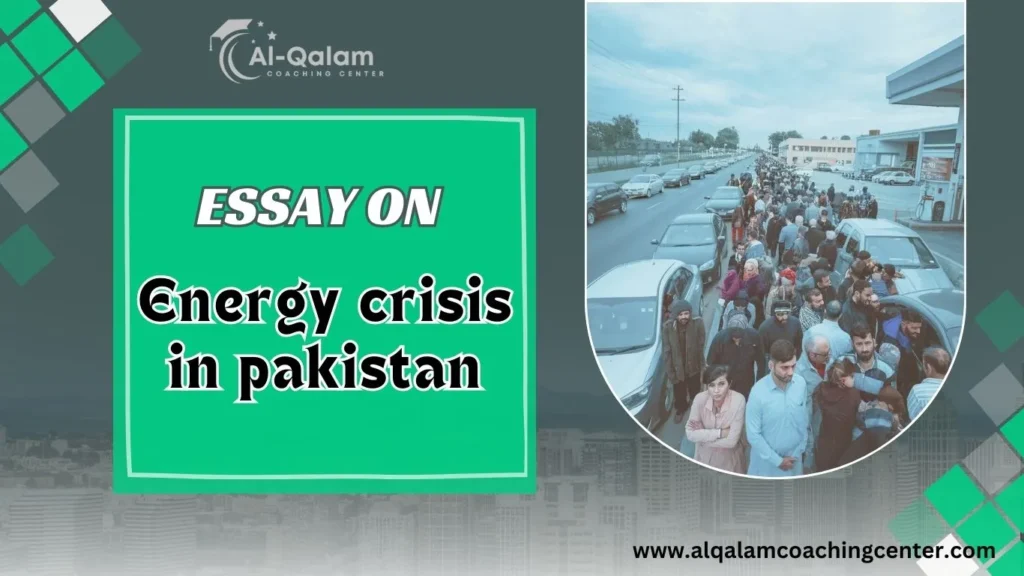Essay On Energy Crisis in Pakistan (200-500 Words)

In this post, you’ll find a well-structured essay on Energy Crisis in Pakistan, suitable for school and college-level students.
Whether you’re preparing for exams or writing assignments, this essay can help. Feel free to check out more resources like [English Essay Topics] or explore the Energy Policy of Pakistan – Official Site to boost your learning.
Essay on Energy Crisis in Pakistan: 200 Words
Pakistan is facing a serious energy crisis that affects its economy, industries, and social development. This issue has been growing over the past decade, resulting in frequent power outages, load shedding, and increased energy costs. The problem began in the 1990’s due to increased energy demand from a growing population and industrialization. At the same time, there was a lack of investment in the energy sector, leading to insufficient electricity, gas, and oil supplies.
One major cause is Pakistan’s heavy reliance on oil and gas, which are expensive and imported. This makes energy costs rise and exposes the economy to global oil price changes. Additionally, the country’s energy infrastructure is outdated and inefficient, causing frequent power cuts. There has also been a lack of investment in renewable energy sources like solar and wind, despite their potential.
The energy crisis has hurt the economy and everyday life. Businesses face difficulties, job losses, and economic instability due to high energy costs and power outages. Rural areas struggle with limited access to essential services. To fix this, the government needs to upgrade energy infrastructure, invest in renewable sources, and encourage private sector involvement.
Essay on Energy Crisis in Pakistan: 500 Words
Pakistan is grappling with a severe energy crisis that impacts its economy, industries, and social development. This crisis has become increasingly evident over the past decade, manifesting in frequent power outages, load shedding, and rising energy costs. The roots of this problem date back to the 1990’s when Pakistan started experiencing growing energy demands due to rapid population growth, urbanization, and industrialization. Unfortunately, there was a lack of investment in the energy sector during this time, resulting in an insufficient supply of electricity, gas, and oil. The government’s failure to address these issues effectively has made the situation worse.
A significant contributor to Pakistan’s energy crisis is its over-dependence on non-renewable energy sources, such as oil and gas. The country has limited domestic reserves of these resources and relies heavily on imports to meet its energy needs. This reliance has caused energy costs to soar and made the economy vulnerable to fluctuations in global oil prices. Additionally, Pakistan’s energy infrastructure is outdated and inefficient. Many power plants use old technology, and the transmission and distribution systems are inefficient and suffer from significant losses. This outdated infrastructure leads to frequent power outages and reduces overall energy efficiency.
Moreover, Pakistan has not invested enough in renewable energy sources like solar, wind, and hydro, despite having substantial potential in these areas. The lack of political will and investment in renewable energy has exacerbated the crisis. Solar and wind energy could provide a sustainable alternative, but without proper investment and encouragement for private sector involvement, this potential remains untapped.
The energy crisis has had severe economic and social consequences for Pakistan. Frequent power outages and load shedding have harmed businesses and industries, resulting in lost productivity and economic growth. Rising energy costs have made it difficult for businesses to operate profitably, leading to job losses and economic instability. Additionally, rural areas suffer from limited access to electricity, which affects their access to essential services such as healthcare and education.
To address the energy crisis, the Pakistani government needs a comprehensive strategy with both short-term and long-term measures. In the short term, upgrading existing energy infrastructure is crucial. This includes modernising power plants, transmission lines, and distribution systems. The government should also promote energy conservation and efficiency by inventing energy-efficient appliances and supporting the adoption of renewable energy sources.
In the long term, investing in renewable energy sources like solar, wind, and hydro is essential. Pakistan has significant potential in these areas, which can help reduce its dependence on non-renewable sources. The government should create a favourable environment for private sector investment by offering incentives and establishing clear regulations.
In conclusion, the energy crisis in Pakistan is a complex issue that requires a multi-faceted approach to resolve. Immediate action is needed to upgrade infrastructure and promote energy efficiency, while long-term investments in renewable energy are vital for a sustainable solution. Without addressing these issues, Pakistan will continue to face serious economic and social challenges.
Related Essays
- Essay On My Country
- Essay On Historical Place in Pakistan
- Essay On My Favourite Book
- Essay On Village Life
- Essay On A Visit To Historical Place Badshahi Mosque
- Essay On Courtesy
- Essay On Festivals In Pakistan
- Essay On Hazrat Muhammad as an Exemplary Judge with quotes
- Essay On Hobbies
- Essay On Inflation
- Essay On A Visit To a Historical Place
- Essay On the problems of Karachi
- Essay On Kindness of Holy Prophet (PBUH)
- Essay on Rising Prices
- Essay On Food Street In Your Area
Download PDF

Hina Khalil
Hina Khalil is a writer with a passion for creativity and storytelling. She contributes essays to the Al-Qalam Coaching Center, drawing on her deep interest in history, politics and social issues. An avid reader, Hina brings a unique perspective to her work, blending her love for literature with a keen awareness of the world around her.

